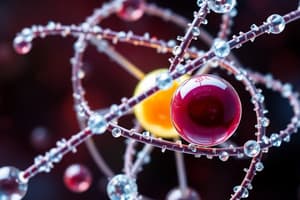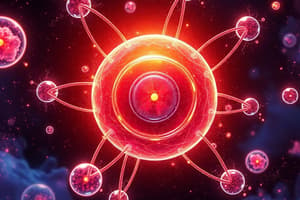Podcast
Questions and Answers
An atom is composed of a nucleus that contains both negatively charged protons and neutral neutrons.
An atom is composed of a nucleus that contains both negatively charged protons and neutral neutrons.
False (B)
100 million atoms aligned next to each other would measure approximately 1 meter across.
100 million atoms aligned next to each other would measure approximately 1 meter across.
False (B)
In an atom, the number of negatively charged electrons equals the number of positively charged protons.
In an atom, the number of negatively charged electrons equals the number of positively charged protons.
True (A)
The nucleus of an atom is composed of protons and electrons.
The nucleus of an atom is composed of protons and electrons.
In the theoretical structure of an atom, the nucleus is indicated by yellow circles representing positive charged nucleous.
In the theoretical structure of an atom, the nucleus is indicated by yellow circles representing positive charged nucleous.
Study Notes
Structure of an Atom
- Atoms are incredibly small; 100 million atoms side by side measure only about 1 cm.
- An atom is composed of a dense nucleus surrounded by a cloud of negatively charged electrons.
- The nucleus contains positively charged protons and electrically neutral neutrons.
- The number of electrons equals the number of protons, resulting in an overall electrically neutral atom.
- Electron cloud is visualized with dark blue circles, representing negatively charged electrons.
- The nucleus is represented with yellow circled charges, indicating positive protons.
- Protons in the nucleus contribute to the positive charge, maintaining electrical balance with surrounding electrons.
Studying That Suits You
Use AI to generate personalized quizzes and flashcards to suit your learning preferences.
Description
Explore the intricate details of atomic structure in this quiz based on Chapter 4 of Chemistry. Understand the components of an atom, including the nucleus and surrounding electrons. Test your knowledge on the fundamental unit of matter and its properties.




